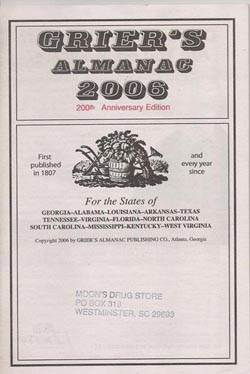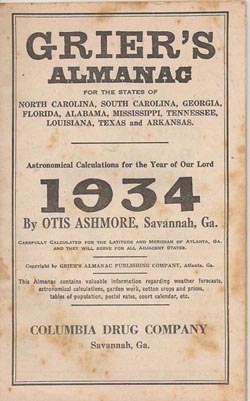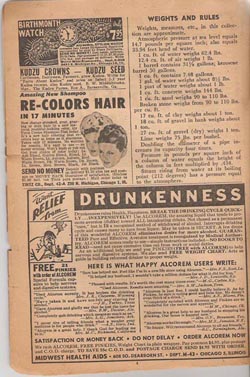















Southern Exposure
The Immigrant Historian
British Expat Enjoys Exploring the South's Past
British Expat Enjoys Exploring the South's Past
It is not every day that one encounters a musician quite like John D'Amato. Scores of recording artists emulate their idols and mentors, and John certainly has his share of influences, but he is distincly different from many of his colleagues in that he has found his place in the field of blues after experiencing genuine struggles, heartbreak and loss. John's willingness to communicate such personal feelings and emotions has resulted in a growing following of fans whose own fears, vulnerabilities and hardships leave them feeling a unique connection to his repertoire of music. Music, especially roots genres like blues and gospel, promotes healing and fosters fellowship, and John has learned to use his craft to advantage.


Those Wonderful Ads!
Older issues of Grier's Almanac are desired by collectors because of the advertising. Within the pages of the 1934 issue (pictured below right), one can find ads for Bayer aspirin, Cheney's Expectorant (for coughs) and Feen-a-mint ("The Laxative That's Just Like Chewing Gum"). While these products were quite common and widely used at the time, a few other items were offered by more obscure companies, and following are just a few of the standouts:
Lots of Useful Stuff, Too
Besides a few hilarious ads and plenty of legitimate promotions, Grier's Almanac contains a helpful gardening calendar, zodiac information, a religious section, a chronological listing of memorable events and informing general interest articles.
Older issues of Grier's Almanac are desired by collectors because of the advertising. Within the pages of the 1934 issue (pictured below right), one can find ads for Bayer aspirin, Cheney's Expectorant (for coughs) and Feen-a-mint ("The Laxative That's Just Like Chewing Gum"). While these products were quite common and widely used at the time, a few other items were offered by more obscure companies, and following are just a few of the standouts:
- 6 6 6 a remedy for colds, headache, fever, biliousness, malaria and constipation available in liquid, tablets, nose drops and a salve! (Editor's note: I'd have to be pretty miserable before I would take something called "666.")
- Smith's Worm Oil, a product of the Galenol Company, Inc. of Atlanta. Described as "one of the oldest and most reliable worm medicines sold."
- Lydia E. Pinkham's Vegetable Compound, a "tonic and regulator" for "girls in their teens." The ad states, "Teach her how to guard her health at this critical time . . . When she is a happy, healthy wife and mother she will thank you."
- Securitee, a "renowned prescription in a jellied form" described as the "married woman's sure, safe method." "Are you financially able to take care of babies and give them the proper attention?," the ad asks. "If not it may be best to delay." Haven't times changed? Today, there is considerable debate over whether school kids should learn about contraception and the prevention of sexually transmitted diseases at younger and younger ages. In 1934, amid the Depression, an ad offering some form of pregnancy prevention made no mention of the word sex, of course, but its intent was pretty clear. "Every married couple should have babies, but it is a great injustice to bring the little darlings into the world if all conditions are not just right." Interesting to note, 1934 was probably not one of those years in which conditions were "just right" for raising children for most southern couples.
- Lucky Las Vegas Cologne (Editor's note: If you're willing to throw away your money at the casinos, spending $5.55 on this stuff probably can't hurt!)
- Dragon's Blood Uncrossing Bubble Bath, "used to destroy jinxes" (Editor's note: A normal shower with soap and water suits me just fine. Jinxes don't scare me.)
- "Make Opposing Lawyer Stupid" Oil and Candle (Editor's note: This must have been used by the O. J. Simpson defense team. Oops, I shouldn't have said that!!!)
- "Stop Evil" Spray Cleaner "Chase evil out of home, church, business," says the ad. (Editor's note: Obeying the Bible and saying, "Get thee behind me, Satan," has always worked for me!)
Lots of Useful Stuff, Too
Besides a few hilarious ads and plenty of legitimate promotions, Grier's Almanac contains a helpful gardening calendar, zodiac information, a religious section, a chronological listing of memorable events and informing general interest articles.

By Tammy Blue
When 200 students walked into their first U.S. History to 1877 course this fall semester, they discovered something quite unexpected. The professor was British. Dr. Colin J. Davis is a distinguished professor and chair of the history department at the University of Alabama at Birmingham (UAB). "You probably saw straight away that I'm from Selma, Alabama," he joked in an English accent to the laughter of his surprised students. This internationally-recognized historian has a passion for teaching and an even greater love for southern history.
Today's lecture is over and Davis sits at a small table in his corner office at UAB's Heritage Hall amidst organized chaos. Papers are stacked and scattered on every flat surface and books overcrowd the shelves. His academic regalia hangs on a rack, accented with the dark green and gold colors representing the University of New York at Binghamton where he received both his Masters and PhD in history. Normally, survey courses are not taught by someone at Davis' level, but with the number of history professors plummeting across the nation it's necessary to attract majors to the discipline. "You've got to have your best teachers in the survey. We're not here just to teach it. We're here to write it."
When 200 students walked into their first U.S. History to 1877 course this fall semester, they discovered something quite unexpected. The professor was British. Dr. Colin J. Davis is a distinguished professor and chair of the history department at the University of Alabama at Birmingham (UAB). "You probably saw straight away that I'm from Selma, Alabama," he joked in an English accent to the laughter of his surprised students. This internationally-recognized historian has a passion for teaching and an even greater love for southern history.
Today's lecture is over and Davis sits at a small table in his corner office at UAB's Heritage Hall amidst organized chaos. Papers are stacked and scattered on every flat surface and books overcrowd the shelves. His academic regalia hangs on a rack, accented with the dark green and gold colors representing the University of New York at Binghamton where he received both his Masters and PhD in history. Normally, survey courses are not taught by someone at Davis' level, but with the number of history professors plummeting across the nation it's necessary to attract majors to the discipline. "You've got to have your best teachers in the survey. We're not here just to teach it. We're here to write it."
Copies of Grier's Almanac are distributed via drug stores, feed & seed dealers and direct mail.

And write history he has. Dr. Davis has written five books, primarily centered on railroad and coal mine workers, labor, and the southern United States. And he's not slowing down. Davis spends two to three hours a day writing in a reserved study carol at the library, currently finishing book number six. "What's keeping me going is my love of history but also the training I have in history, how to do the research but also critically how to write."
Still speaking with an English accent after over 20 years in the USA, Davis talks about growing up in East Anglia, the region northeast of London, and living in an "all-female world." With no father figure, he credits his progressive outlook to growing up with four sisters and the influence of his mother. When he was an undergraduate at the University of Warwick in Britain, his fascination with groups under oppression led this soccer playing jock to take courses in women's history. "Some women were just part of that equation whether they were Native American or whatever. So I've always been very sensitive to that." In fact, Davis' passion for the underdog is what drew him to working class history and continuing his studies in the United States. "I thought, 'If you're going to do the subject, why not immerse yourself in that culture.'" So, in 1981, Davis left his family behind and came to New York City with nothing but a "rubbing sack" on his back.
Still speaking with an English accent after over 20 years in the USA, Davis talks about growing up in East Anglia, the region northeast of London, and living in an "all-female world." With no father figure, he credits his progressive outlook to growing up with four sisters and the influence of his mother. When he was an undergraduate at the University of Warwick in Britain, his fascination with groups under oppression led this soccer playing jock to take courses in women's history. "Some women were just part of that equation whether they were Native American or whatever. So I've always been very sensitive to that." In fact, Davis' passion for the underdog is what drew him to working class history and continuing his studies in the United States. "I thought, 'If you're going to do the subject, why not immerse yourself in that culture.'" So, in 1981, Davis left his family behind and came to New York City with nothing but a "rubbing sack" on his back.


For nearly half a century, Thomas P. Ashmore made the astronomical calculations for Grier's Almanac. Upon his death in 1882, he was succeeded by his nephew, Otis Ashmore. A Savannah educator and scientist, Otis Ashmore saw the almanac fall on hard times. It was in 1912 that Frank Lamar Fleming of John B. Daniel, Inc., an Atlanta wholesale drug company, acquired the publication at a Savannah bankruptcy auction. In spite of the ownership change, Otis Ashmore remained with Grier's, making astronomical calculations until his death in 1934. Pictured is his last issue.
Dr. Colin Davis, University of Alabama

Having never set foot in the States before, it was a frightening move. The most difficult things to acclimate to were gun crime, uncommon in England, and the overabundance of food. The fact that his accent gave the fallacy he was a "Lord Somebody", or that he didn't know American history, was a huge pet peeve for Davis. After several years in adjunct positions throughout the New York metropolitan area, a position in U.S. Labor History opened at UAB. It was a perfect fit for Davis. But the American South came with its own nuances. Visual, spoken and unspoken codes have taken him almost 20 years to figure out. "Sometimes I've been insulted, and I had no idea. 'Oh, that's precious', which we know what that means."
During that time, Davis became an American citizen, met and married his wife, and now has three teenage daughters. While Davis still has love for his native country, there's no doubt he considers himself an American. Sentimentality shows in his eyes behind his black framed glasses, and he admits to getting emotional when hearing someone sing the national anthem. He also remembers crying when pledging his Oath of Allegiance. "When I fly through Atlanta and the guy says, 'Welcome home, sir,' I get a good glowing feeling when they say that."
Considering his own background, Davis has a strong opinion on immigration and suggests that those currently opposing migrants coming to the States should remember where they came from. "They need to go back and look at their history and background if they were Irish or Italian or Slavic. But I think there's this thing where people think history is not that particularly relevant." Davis suggests that while nationality is great in terms of culture it's also dangerous because it creates separation. Yet even when the country seems to disagree on almost every issue, Davis remains positive. "I don't think the country is broken, I think it's politically divided. But then every country is politically divided. I just think people need to understand more of their history. That's why I don't understand why we got here, why we got like this."
According to Davis, the significance of the South in the context of national politics and economics is huge. "Even though we've got a very small population down here, you've still got two senators in each state. And it's incredible they still have a major political influence." There's also no denying the South's positive cultural impact on the rest of the nation, particularly with tourism. "It's so rich down here that it has this cachet." Travelers venture south not just for the barbeque and grits, but for the civil rights history. "People go to Savannah, they go to Charleston, New Orleans and even Birmingham. People want to get a sense of what happened here and [whether] it has changed or not changed." And the visitors he's met are incredibly impressed. "They're expecting this backwater, this defensiveness, this denial when in fact it's not really like that."
In fact, the emergence of diversity and migration below the Mason-Dixon is creating what Davis calls "The New South." He debunks any theory that the progress will undermine the tradition of southern values, but notes there is reluctance from some of the older generation who are realizing their cultural values are not necessarily the same as their children. The party pushing the so-called "traditional values" fear that they are losing something, when in fact they aren't losing anything. "This is not a monolithic tradition, people are evolving. And as long as you are recognizing your history rather than ignoring it and cherry-picking what you want, I think you're in good shape. So I'm positive about it."
When asked about retirement, Davis shrugs at the idea. He's anxious to head back to the library, and he's on a roll. His sixth book about North Atlantic fishermen and their wives is almost finished. It's a subject close to the scholar's heart because his mother was the daughter of a fisherman, and his grandmother lost two husbands to the sea. "I got to that stage in life where I can actually do whatever I bloody want, so I'm very excited," says Davis. In the next few months, he'll travel to England and Iceland to present. "It's a lot of work, but it's not a chore. I meet faculty from all over the world with different disciplines and ways of looking at things. It's so invigorating. Retirement means you start watching Oprah, but that's going to be bloody sad." Davis jokes he'd have to win the lottery to afford a summer cottage in England, and he's perfectly content here in the American South. "This is home. I love this country, I love the freedom it has given me."
Sources
Interview with Dr. Colin Davis, October 2015
Author: Tammy Blue. Published November 21, 2015.
During that time, Davis became an American citizen, met and married his wife, and now has three teenage daughters. While Davis still has love for his native country, there's no doubt he considers himself an American. Sentimentality shows in his eyes behind his black framed glasses, and he admits to getting emotional when hearing someone sing the national anthem. He also remembers crying when pledging his Oath of Allegiance. "When I fly through Atlanta and the guy says, 'Welcome home, sir,' I get a good glowing feeling when they say that."
Considering his own background, Davis has a strong opinion on immigration and suggests that those currently opposing migrants coming to the States should remember where they came from. "They need to go back and look at their history and background if they were Irish or Italian or Slavic. But I think there's this thing where people think history is not that particularly relevant." Davis suggests that while nationality is great in terms of culture it's also dangerous because it creates separation. Yet even when the country seems to disagree on almost every issue, Davis remains positive. "I don't think the country is broken, I think it's politically divided. But then every country is politically divided. I just think people need to understand more of their history. That's why I don't understand why we got here, why we got like this."
According to Davis, the significance of the South in the context of national politics and economics is huge. "Even though we've got a very small population down here, you've still got two senators in each state. And it's incredible they still have a major political influence." There's also no denying the South's positive cultural impact on the rest of the nation, particularly with tourism. "It's so rich down here that it has this cachet." Travelers venture south not just for the barbeque and grits, but for the civil rights history. "People go to Savannah, they go to Charleston, New Orleans and even Birmingham. People want to get a sense of what happened here and [whether] it has changed or not changed." And the visitors he's met are incredibly impressed. "They're expecting this backwater, this defensiveness, this denial when in fact it's not really like that."
In fact, the emergence of diversity and migration below the Mason-Dixon is creating what Davis calls "The New South." He debunks any theory that the progress will undermine the tradition of southern values, but notes there is reluctance from some of the older generation who are realizing their cultural values are not necessarily the same as their children. The party pushing the so-called "traditional values" fear that they are losing something, when in fact they aren't losing anything. "This is not a monolithic tradition, people are evolving. And as long as you are recognizing your history rather than ignoring it and cherry-picking what you want, I think you're in good shape. So I'm positive about it."
When asked about retirement, Davis shrugs at the idea. He's anxious to head back to the library, and he's on a roll. His sixth book about North Atlantic fishermen and their wives is almost finished. It's a subject close to the scholar's heart because his mother was the daughter of a fisherman, and his grandmother lost two husbands to the sea. "I got to that stage in life where I can actually do whatever I bloody want, so I'm very excited," says Davis. In the next few months, he'll travel to England and Iceland to present. "It's a lot of work, but it's not a chore. I meet faculty from all over the world with different disciplines and ways of looking at things. It's so invigorating. Retirement means you start watching Oprah, but that's going to be bloody sad." Davis jokes he'd have to win the lottery to afford a summer cottage in England, and he's perfectly content here in the American South. "This is home. I love this country, I love the freedom it has given me."
Sources
Interview with Dr. Colin Davis, October 2015
Author: Tammy Blue. Published November 21, 2015.
This sampling from the 1953 issue of Grier's Almanac features a half-page ad offering an "amazing liquid that tends to promote aversion (dislike) toward ALL intoxicating drinks." Also, kudzu had apparently not sufficiently invaded the South by 1953. B. W. Middlebrooks of Barnesville, Georgia, was advertising seed and kudzu crowns for sale! Quite a contrast from the previously illustrated 1934 edition, the 1953 issue featured ads from two separate publishers promoting illustrated books on the topic of sex!
BIBLIOGRAPHY
Frank Veale Jr., "Georgia's Amazing Robert Grier: They Forgot Him, But Not Almanack," Atlanta Journal, October 7, 1967.
"Grier's Almanac," New Georgia Encyclopedia. Retrieved May 15, 2006: http://www.newgeorgiaencyclopedia.org
"This Day in Georgia History: January 9: 1780," Carl Vinson Institute of Government (University of Georgia). Retrieved October 2004: http://www.cviog.uga.edu
OTHER SOURCES
Telephone conversations with Bryan Bachler, Grier's Almanac Publishing Company, Atlanta, in October 2004 and on January 19, 2005
1934 Grier's Almanac
1953 Grier's Almanac
2006 Grier's Almanac
Frank Veale Jr., "Georgia's Amazing Robert Grier: They Forgot Him, But Not Almanack," Atlanta Journal, October 7, 1967.
"Grier's Almanac," New Georgia Encyclopedia. Retrieved May 15, 2006: http://www.newgeorgiaencyclopedia.org
"This Day in Georgia History: January 9: 1780," Carl Vinson Institute of Government (University of Georgia). Retrieved October 2004: http://www.cviog.uga.edu
OTHER SOURCES
Telephone conversations with Bryan Bachler, Grier's Almanac Publishing Company, Atlanta, in October 2004 and on January 19, 2005
1934 Grier's Almanac
1953 Grier's Almanac
2006 Grier's Almanac
Copyright
Southern Edition
All Rights Reserved
Southern Edition
All Rights Reserved
All materials contained on this site, including text and images, are protected by copyright laws and may not be reproduced without prior written permission from the publisher. Where applicable, use of some items contained on this site may require permission from other copyright owners.
Fair Use of text from SouthernEdition.com is permitted to the extent allowed by copyright law. Proper citation is requested. Please use this guide when citing a Southern Edition article.
Contact Greg Freeman or SouthernEdition.comFair Use of text from SouthernEdition.com is permitted to the extent allowed by copyright law. Proper citation is requested. Please use this guide when citing a Southern Edition article.